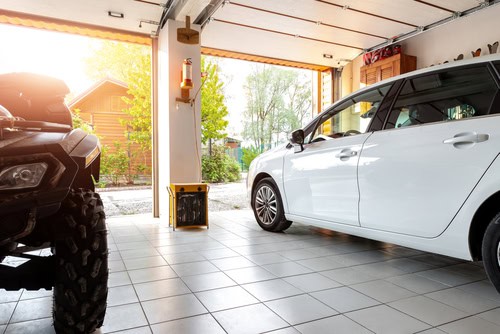Multiple Car Insurance Coverage Guide
If you live in a home with multiple cars, you could purchase an auto insurance policy for each one. But typically it’s more convenient—and cheaper!—to insure all the vehicles under one multi-car insurance policy.
But how does it work? What are the pros and cons? And does it offer the same coverage?
Sit tight, because we’ve got the answers to all your questions. Keep reading to find out if a multi-car policy is the right option for you.

What Is Multi-Car Insurance and How Does it Work?
A multi-car policy allows you to purchase a single policy to cover multiple vehicles—usually between two and five. This situation is most likely in a family that has two or more cars all garaged at a single location (spouse, family member, or roommate). Rather than purchasing two separate car insurance policies, you simply insure both vehicles on the same policy. You pay one combined premium rather than two, and will usually earn a multi-car insurance discount.
However, the requirements for multi-car insurance policies will vary by provider. For example, most insurance companies require that all the vehicles on a multi-car policy must be kept at the same address. Other carriers factor in the vehicle owner’s relationship to the policyholder.
Regardless, if you have more than one vehicle in your home, multi-car insurance may be a good option—and we’ll explore the pros and cons and specific discounts below.
How Much Can Multiple Vehicle Policies Save On Insurance?
The biggest advantage of multi-car insurance is that many providers offer a price break to households that insure multiple cars under one policy. Each insurance company has its own criteria for setting costs, so discount rates will vary, but you could save as much as 39% on your premiums. Here are a few insurers that will reduce your per-vehicle rate if you add extra cars to your policy.
- Multi-car discount
- Progressive– up to 12%
- Amica– up to 25%
- Geico– up to 25%
- Direct Auto– up to 25%
- Elephant- up to 39%
- State Farm- discounts vary by state
Many providers offer a multi-car discount, so check with yours if they’re not listed here. If they don’t offer the deal you were hoping for, it never hurts to haggle. Most insurers will be willing to increase the discount if you are insuring a number of cars with them.
The Pros and Cons of Multi-Car Insurance
This type of coverage is a great option for families and groups, with plenty of advantages over individual policies, but there are some things to keep in mind when deciding if a multi-car policy is right for you. Here are the major benefits to having a multiple vehicle insurance policy:
- Better coverage. Because multi-car insurance offers a price break, you can use that savings toward more comprehensive coverage than you otherwise could afford.
- Lower deductible costs. Some companies have one deductible for all your vehicles when you purchase a multi-car insurance policy. For example, if two of your vehicles are damaged in the same storm, you’ll only have to pay one deductible for both cars.
- Access to stacked insurance coverage. Some insurers offer the ability for policyholders to “stack” uninsured motorist coverage. This means you can combine coverage limits for more than one vehicle, thereby doubling (for two cars) or tripling (for three cars) your overall uninsured motorist coverage. Stacked insurance typically applies to underinsured and uninsured motorist coverage.
- Having different drivers is fine. As long as all cars on the policy are registered at the same address, it doesn’t matter if the car has different main and named drivers.
What are the Disadvantages of Multiple Vehicle Coverage?
- Certain drivers will face price spikes—or won’t be covered at all. Your insurer will determine your premium based on the risk assessment of everyone on the policy. Therefore, if you or someone you live with qualifies as a high-risk driver, your insurance company may increase your costs—or they may choose not to offer coverage at all. A high-risk driving record includes a history of accidents, traffic violations, or driving under the influence. Very young or very old drivers are also considered to be high risk-drivers.
- One renewal date. When you have a multi-car insurance policy, all the car insurance policies in your home will have the same renewal date. Not only that but the premium you need to pay will be significantly larger. If your finances are tight, it may be a better choice to spread out the payments for different policies, rather than making one large payment all at once.
- It could cause higher rates after a claim. If you share a policy with someone in your home who files a claim, you may see a higher monthly premium as a result.
- You could become ineligible for other discounts. Sharing a multi-car policy means everyone must remain eligible to qualify for specific discounts. For example, if you have a clean driving record, you may qualify for a good driver discount if the policy is in your name only. But if you share coverage with a driver who has multiple tickets on their record, you may lose eligibility for the discount given to policyholders with spotless driving histories.
What Coverage Do You Need on a Multi-Car Policy?
Nearly every US state requires drivers to have liability insurance, which pays for damage you cause in a car accident, so this will likely be covered in your multi-car policy. Minimum coverage is required by law and can vary by state, but the coverage requirements are the same for single-car and multi-car insurance policies, regardless of where you live. Minimum insurance is cheaper than full coverage, which usually includes collision and comprehensive insurance. However, if you have a lease or loan, your lender may require you to carry a higher level of protection.
Are Coverage Levels Customizable for Each Vehicle?
The simple answer is that some types of coverage are customizable for each vehicle, while others are not. Your liability and uninsured motorist coverage limits are set at the policy level, which means you can’t customize them to each driver or vehicle. But beyond that, you might be able to mix and match coverage on a vehicle-by-vehicle basis.
For example, you might select different deductibles for each vehicle’s collision and comprehensive coverage. Or you might decide to keep collision and comprehensive insurance on one car but not another.
There’s one important caveat to keep in mind, however. There are certain add-on coverages that must be applied to all vehicles on a multi-car policy, if you choose to add them at all. These include things like coverages for bodily injury, property damage, and uninsured drivers. Your provider can walk you through these and help you decide which level of customization is right for you.
Want to Lower Your Auto Insurance Rates for Good?
One of the best ways to keep your rates down is to find an insurance policy that offers you low-cost coverage—and we’ve done all the searching for you. Thanks to our fast and affordable online insurance quotes, you can choose a plan that beats your previous rates—while still offering the same comprehensive coverage! Get yours today and enjoy the peace of mind that you’ll be protected—while also saving money every month.
